Talking to kids about…
Information & example sentences
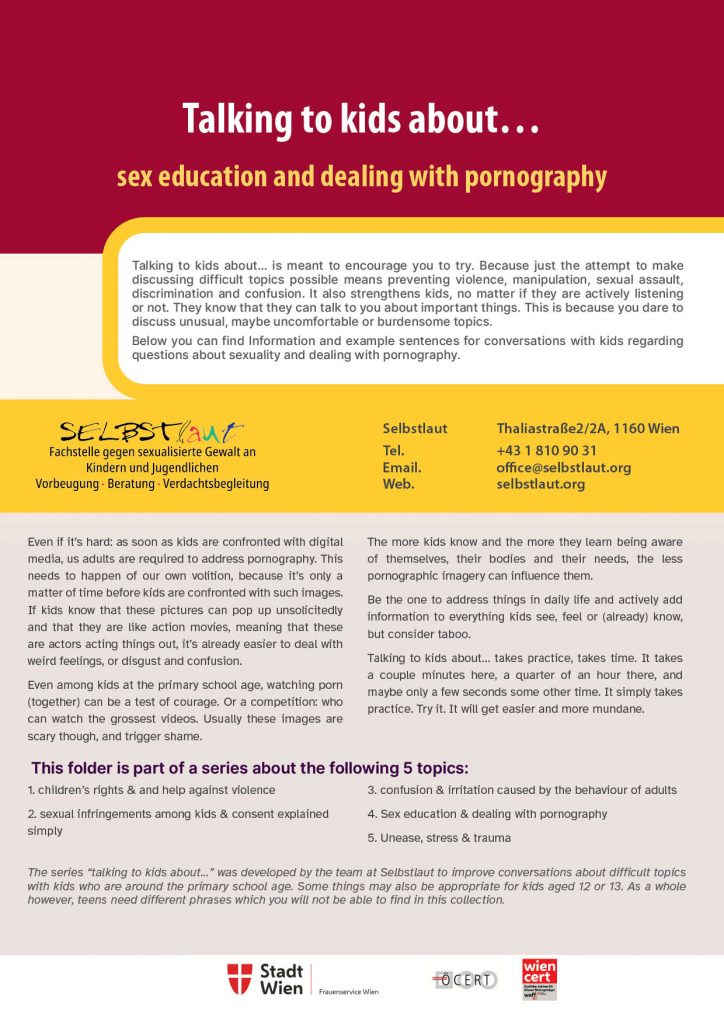
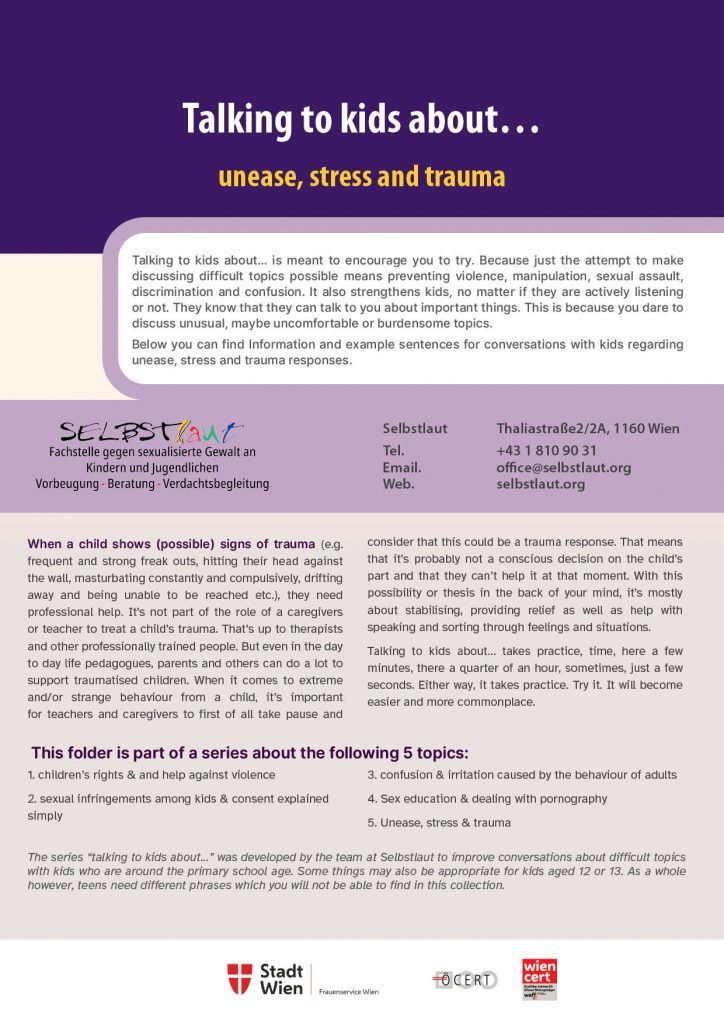
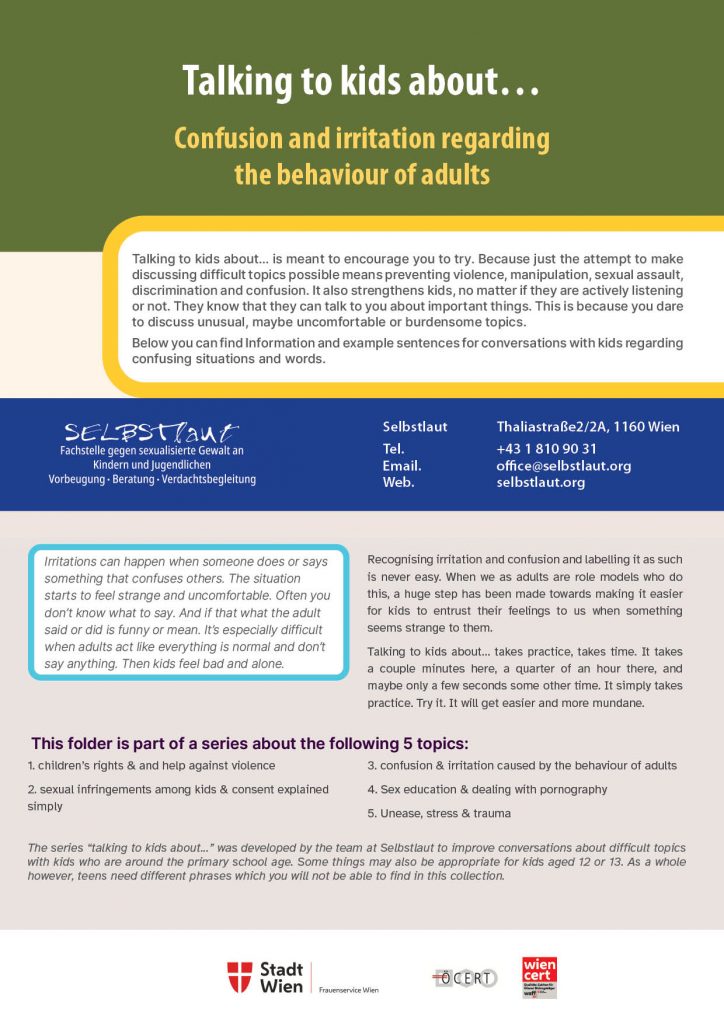
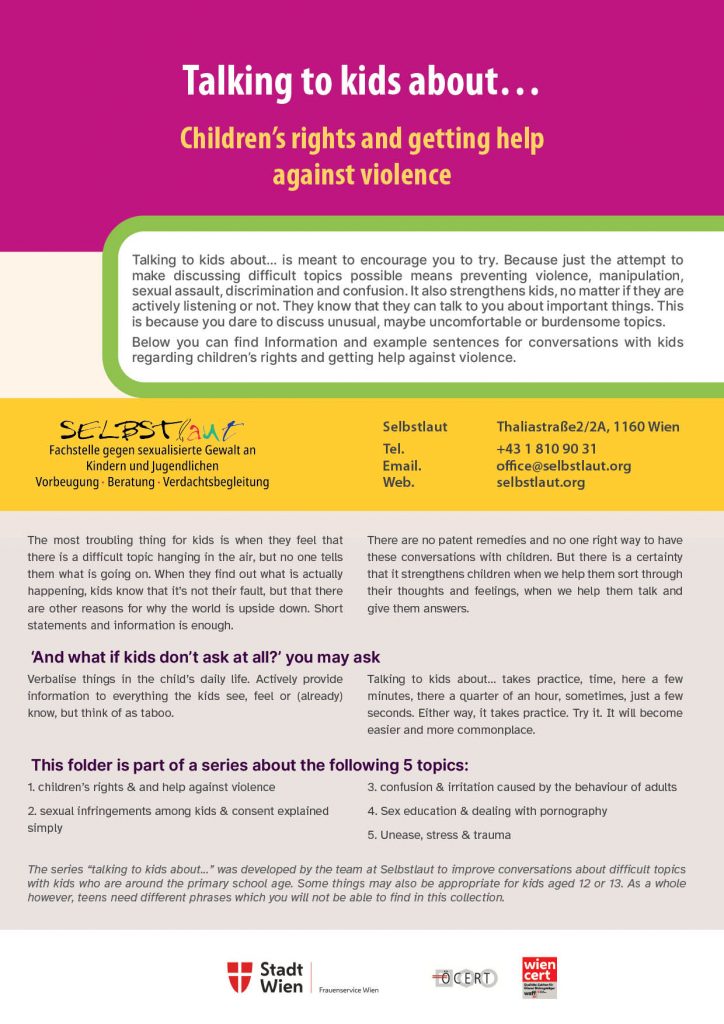
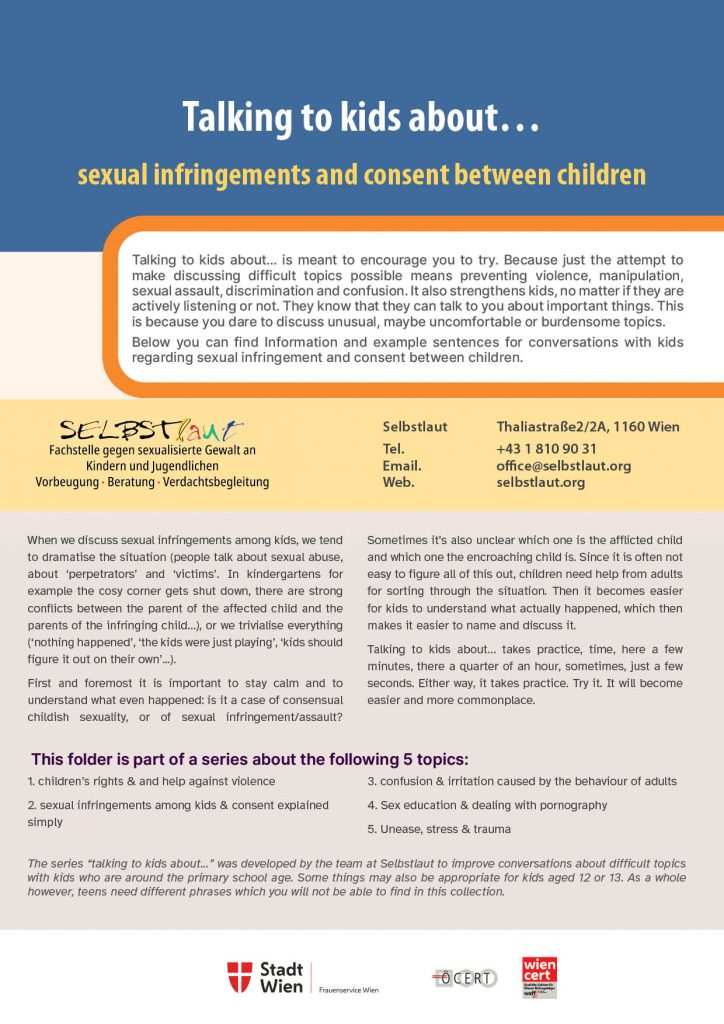
- Information for Adults about Sexual Education
- Overview of Information on Preventing Sexual Abuse
of Children and Youth - A set of cards with all kind of feelings
- How to talk with your child if a teacher at school commited sexual child abuse
- Video of „Doing It. Doing What?“, a book about sexual education
1) Information for Adults about Sexual Education
Dear mothers, fathers, legal guardians and significant others,
with this letter, the staff of SELBSTLAUT, would like to invite you to get a first glimpse of the many new games
and exercises within the field of sexual education, so that you can see what the materials provide your children
and which themes and methods are used to give orientation within this very sensible field that is playful and
appropriate for children.
Every child has been discovering themselves, their own body and their own childish sexuality from birth on-
wards, at their own pace and constantly based on the values that are conveyed and passed on in the family
and at home.
Sexual education is neither about pitting concepts and ideologies against each other, nor is it about us telling
you what is right and suitable for your child and when. You know that better. You know your child. However,
what we can contribute, as specialists in the field of prevention of sexualized violence, is twenty years of expe-
rience in talking with children of all ages about bodies and sexuality as a central part of the prevention of sexual
exploitation of children.
Talking about feelings, differentiating between comfortable and uncomfortable touching, age-appropriate
information concerning fertilization, pregnancy, sexuality, consent and boundaries and much more strengthens
children and makes it easier for them to develop in a positive manner. They are better protected against sexual
assault through adults and other children, and can learn to differentiate between what is and what is not good
for them.
In addition, children need guidance in a world of hypersexualization and pornographization in the media.
Children can’t be prevented from seeing portrayals of sexuality and pornographic images in public spaces, on
television and the Internet. This can be unsettling, disconcerting, maybe also a bit exciting, but, in any event,
overstraining. When adults remain silent, children are swamped with what they cannot grasp because of their
lack of experience. Sexual education at home and in school is a good and appropriate means to support and
strengthen children in this area. Thus, “sleeping dogs” aren’t woken and children aren’t forced to deal with
topics they don’t want to, but rather an accompaniment is made possible for something that is present every-
where.
If you look into the materials, you will see that they are not concerned with sexual practices or the details of
how children are conceived. Instead, they are about feelings & senses, consent & boundaries, love & affection,
identity & body, intimacy & childish sexual activities, words & spaces, the cycle and babies.
The materials, which were re-developed by the staff of Selbstlaut and tested in prevention workshops in primary
school classes, are intended for work in schools, but also for interested parents. The more legal guardians and
important significant others are included in sexual education, the more it will be consistent for the children and
the more they can talk freely about what they are preoccupied with.
Translation: Sam Osborn
2) Overview of Information on Preventing Sexual Abuse of Children and Youth
As adults it is our responsibility to protect girls and boys from sexual abuse; this is also because we are able to provide children with diverse possibilities of action within such situations. That’s why it’s necessary to get informed about sexual abuse and preventative measures against it.
Almost over 90% of sexual abuse on girls and boys takes place within the family or is initiated by closer friends of the family. The majority of the perpetrators are male and the abusive situation always linked to secrecy, a vow „not to tell“. The fact that an adult friend, a close relation or a loved one abuses their position of power in order satisfy their own sexual wishes results in conflicting emotions for the girls and boys involved.
There is no such thing as a patented prescription against this type of exploitation of persons. Yet there are many different ways to support girls and boys
and actively strengthen their self-assurance in their own awareness of situations and their feelings.
Prevention work is not about giving instructions, warnings or prohibitions, but more about one’s attitude, on how one communicates openness, security and respect towards children. It is the responsibility of grown-ups to respect children’s feelings, needs and boundaries, to take them seriously, to strengthen their self-confidence and to accept „no“ as an answer. Strong, self-assured and well-informed girls and boys able to defend themselves are less likely to experience an assault and are more able to get help if they are assaulted.
The most important requirement for preventative action is that adult women and men rethink their own functions as a role-models through listening to and articulating their own feelings.
Important points in preventative action
against sexual abuse of girls and boys
Trusting your own feelings when interacting with others is THE decisive point in protecting yourself. Growing up does not mean getting over your own feelings, but being able to be conscious of and articulate all of your varying mixed and contradicting feelings. The main objective is to recognize and respect your own and other&’s feelings.
Children have the right to make their own decisions about their own body and to decide who, when and where their body is allowed to be touched. In working with children it is important to create an atmosphere in which they feel that their body is one-of-a-kind, worth being protected and that it is appreciated as such.
Girls and boys need affection. But very often they are touched in a way one takes for granted that it is o.k. It is our responsibility as adults to prevent such unwanted touching.
Extensive sex education, for each age group accordingly, is important for all young persons so that they can experience their bodies and sexualities as something positive, beautiful and tender. Children should have words for all of their body parts including their genitals.
These words should not be embarrassing, their questions should be taken seriously and they should receive accurate answers.
There are many different kinds of touching that are nice and others that cause uncomfortable or „funny“ feelings. Children are readily able to distinguish between these different feelings. It is necessary that they are supported in their ability to perceive these differences, because precisely these feelings of uneasiness due to „funny“ types of touching (that can be confusing) are very important in dealing with sexual assault.
There are wonderful secrets that are fun to keep rom others and there are oppressive, funny secrets that are scary and don’t feel right. We can talk to children, and tell them that secrets that scare them and are bound to threats are not secrets, they are bribery; it must be made clear that talking about these instances is not „telling a secret“ or tadle-tale-like. All people have the right to set boundaries and to say „no“ and to have this be accepted by
others. As adults in a role-model position it is important to make one’s own boundaries visible and audible, and if a dispute arises, to declare these boundaries clearly. In this way girls and boys learn through the model presented to them by adults, a model which offers them the possibility to say „no“ and that their „no“ will be heard.
It is not a sign of weakness to ask for help and support, as a matter of fact just the opposite is true. It is an important experience and important information for girls and boys that it is brave to ask for help and that they have the right to choose who they want to ask. It is good to talk about experiences with children; and in case no one believes them they should be encouraged to go to others for support. Furthermore, it is
important for adults to accept that their child may prefer to go to someone else for help (rather to their own parents). Children often feel guilty. Not only when adults fight or act unfairly, but also if something „funny“, „secretive“ or oppressive is in the air.
It is the adults‘ responsibility to relieve children of their guilt in these situations, and to let them know that it is not their fault if someone is in a bad mood, if they are touched in a bad way, or if someone talks to them in a way they don’t want to be spoken to.
Children learn from us adults, from the media, and from language and images which surround them.
This includes typical patterns of behavior for certain roles,e.g. boys learn to take up more space; or girls are brought up to be more considerate.
It is important that we remain conscious of our own images of roles and that we try to convey the full spectrum of emotions and scope of action as
being possible for all genders. Kids who are dissatisfied with or rebel against so-called „normal“ behavior are to be taken seriously. Those who are pushed, sexualized or offended by others of the same age group; and those who don’t want to play „Rambo“ and are made fun of, need our support. Because it takes a lot of courage and energy to forge one’s own way through the existing norms and imbalanced circumstances of our society.
Translation: ERIKA DOUCETTE
3) Cards: All kinds of feelings
4) How to talk with your child if a teacher at school commited sexual child abuse
5) Video of the book „Doing It. Doing What?“
(in two parts, translated and read by Sam Osborn)

